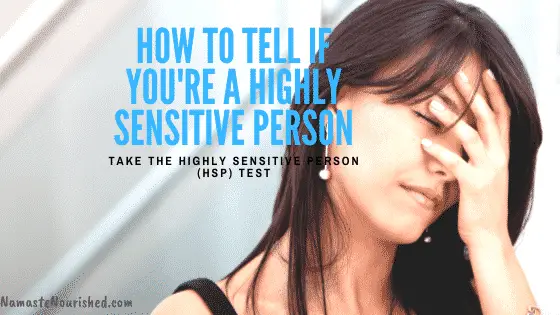Do you ever wonder if you are a Highly Sensitive Person, or HSP? Psychologists sometimes refer to this as a Sensory Processing Sensitivity (SPS).
Being an HSP is not a condition or disorder. It is thought to be a neutral trait that about 20% of the human population possesses. It is thought to be a survival strategy that allows people to process information or stimuli more thoroughly than others do.
If this describes you, then this evolutionary trait means you process data and sensory input more than other people do. Put simply, your senses receive more signals/input than the average person.
And just a note of reassurance – Don’t worry, HSP is not a condition or disorder. There is nothing you need to “fix” about yourself. The downside is that this leads to feeling overstimulated and can cause extra stress for people with HSP and make them often feel “stressed out” or “overwhelmed.”
In truth, being an HSP means you are better prepared than most other people to understand and decipher certain situations.
For example, when most people witness an event, or hear a sound, and can make a snap judgment, you are more likely to contemplate things more deeply. So an HSP processing a sound that startles them might stay focused on that sound and then it might be more distracting to their body and mind when compared to others around them.
Being Highly Sensitive Can Be a Good Thing
Being overly sensitive can actually be a positive in many situations. For example, while most people may take a situation at face value, someone who is highly sensitive can identify underlying motivations or details that most people miss. People with HSP make great analysts for this reason!
The downside is that this oversensitivity can lead to overstimulation due to the massive amount of sensory input we all receive every day since as we are all bombarded with audio, video and visual information. If you are an HSP, you are more “tuned in” to your senses and may have stronger reactions to situations or environments than your friends do.
Research shows that the majority of HSP’s are introverts (approximately 70%). Introverts derive their energy from themselves and tend to look inward and prefer a smaller number of close-knit friends and less simulation. This helps them recharge their batteries.
By contrast, extroverts derive their energy from interacting with others a lot and more stimulating experiences. They enjoy crowds, have many friends and love being around others. Extroverts, who are also highly sensitive, need to withdraw at times from social interaction and enjoy some downtime.
Highly Sensitive Person (HSP) Test Questions
It’s important to understand if you are a Highly Sensitive Person, because if you are, and understand that that means, then you can make adjustments that will lead to a happier, lower stress life vs. someone that doesn’t have that same level of self-awareness.
Put simply, if you know you are an HSP, you can adjust and manage how you respond to the world around you.
Your answers to the following questions may indicate whether you have the traits of a highly sensitive person and whether you may require more time and mental energy to process information.
- Are you easily startled?
- Do you feel uncomfortable with loud noises?
- Is it easy for your mood or mental state to be affected by those around you?
- Are you a perfectionist – Do you spend a lot of time trying to avoid making mistakes?
- Do you prefer to avoid violence and sex in television shows and movies?
- Do you often have to withdraw and go to a quiet space to calm your nerves?
- Do you feel like your senses are fine-tuned?
- Do you prefer mild lighting? Do bright lights bother you?
- Is it difficult to concentrate if someone watches you while you are working?
- Are you easily overwhelmed or overstimulated by sights, sounds, tastes, smells and things you touch or feel?
- Do music, literature and other arts move you deeply?
- Are changes in your life, even small changes, capable of rattling you and shaking you up?
- Is it important to you to avoid possibly overwhelming, upsetting or overstimulating situations rather than dealing with them, even if the outcome could be favorable for you?
- Do you prefer a minimalist existence rather than having lots of input and lots of things going on at the same time?
Note: If you’re a highly sensitive person, be sure to read about the personality types you should avoid!
How to Interpret Highly Sensitive Person (HSP) Test Results
If you answered yes to the majority of these questions, you are likely to be a highly sensitive person. Having the awareness that you are more sensitive to the environment will help you deal with things and manage your responses more effectively.
If your extra sensitive nature has caused you problems in the past, understanding you were born this way can help you become more aware of your feelings and behaviors and better monitor them. Taking time away from things that are causing you overstimulation is very important since this helps to establish a physical boundary.
In closing, if you are an HSP and tend to be more open and emphatic to other people and your environment, it is especially more important for you to recognize and establish boundaries to create a protective barrier between you and the rest of the world.

Finally, be sure to read our Survival Guide For Highly Sensitive People


